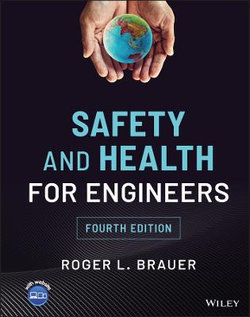SAFETY AND HEALTH FOR ENGINEERS
A comprehensive resource for making products, facilities, processes, and operations safe for workers, users, and the public
Ensuring the health and safety of individuals in the workplace is vital on an interpersonal level but is also crucial to limiting the liability of companies in the event of an onsite injury. The Bureau of Labor Statistics reported over 4,700 fatal work injuries in the United States in 2020, most frequently in transportation-related incidents. The same year, approximately 2.7 million workplace injuries and illnesses were reported by private industry employers. According to the National Safety Council, the cost in lost wages, productivity, medical and administrative costs is close to 1.2 trillion dollars in the US alone. It is imperative—by law and ethics—for engineers and safety and health professionals to drive down these statistics by creating a safe workplace and safe products, as well as maintaining a safe environment.
Safety and Health for Engineers is considered the gold standard for engineers in all specialties, teaching an understanding of many components necessary to achieve safe workplaces, products, facilities, and methods to secure safety for workers, users, and the public. Each chapter offers information relevant to help safety professionals and engineers in the achievement of the first canon of professional ethics: to protect the health, safety, and welfare of the public. The textbook examines the fundamentals of safety, legal aspects, hazard recognition and control, the human element, and techniques to manage safety decisions. In doing so, it covers the primary safety essentials necessary for certification examinations for practitioners.
Readers of the fourth edition of Safety and Health for Engineers readers will also find:
- Updates to all chapters, informed by research and references gathered since the last publication
- The most up-to-date information on current policy, certifications, regulations, agency standards, and the impact of new technologies, such as wearable technology, automation in transportation, and artificial intelligence
- New international information, including U.S. and foreign standards agencies, professional societies, and other organizations worldwide
- Expanded sections with real-world applications, exercises, and 164 case studies
- An extensive list of references to help readers find more detail on chapter contents
- A solution manual available to qualified instructors
Safety and Health for Engineers is an ideal textbook for courses in safety engineering around the world in undergraduate or graduate studies, or in professional development learning. It also is a useful reference for professionals in engineering, safety, health, and associated fields who are preparing for credentialing examinations in safety and health.




Share This Book: